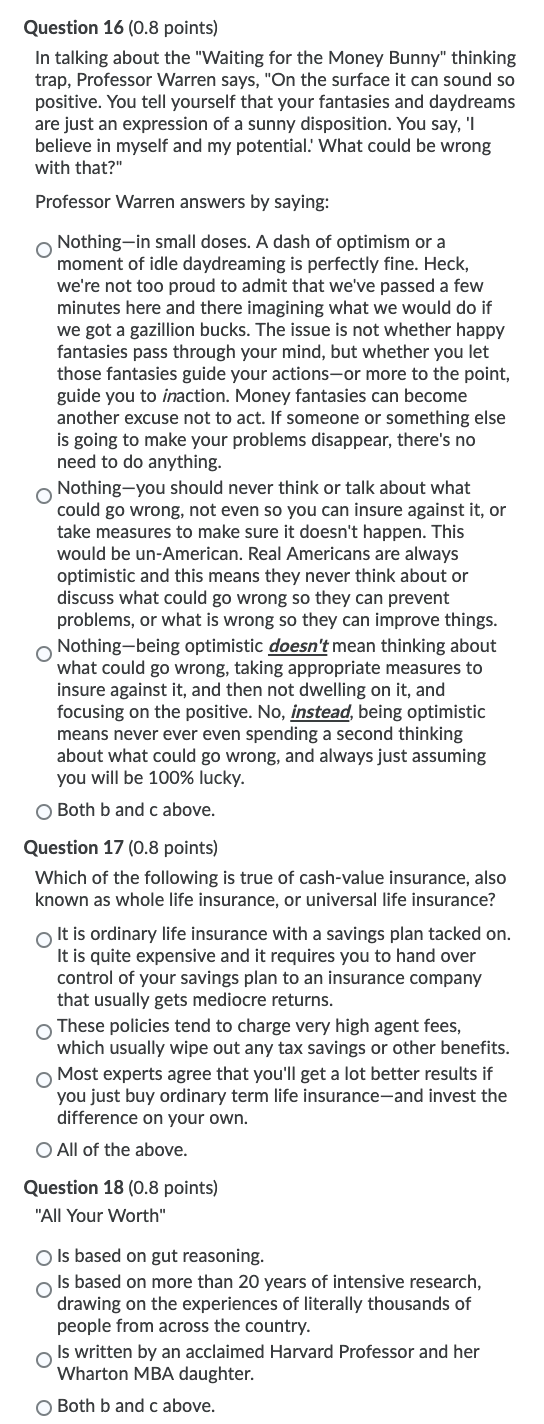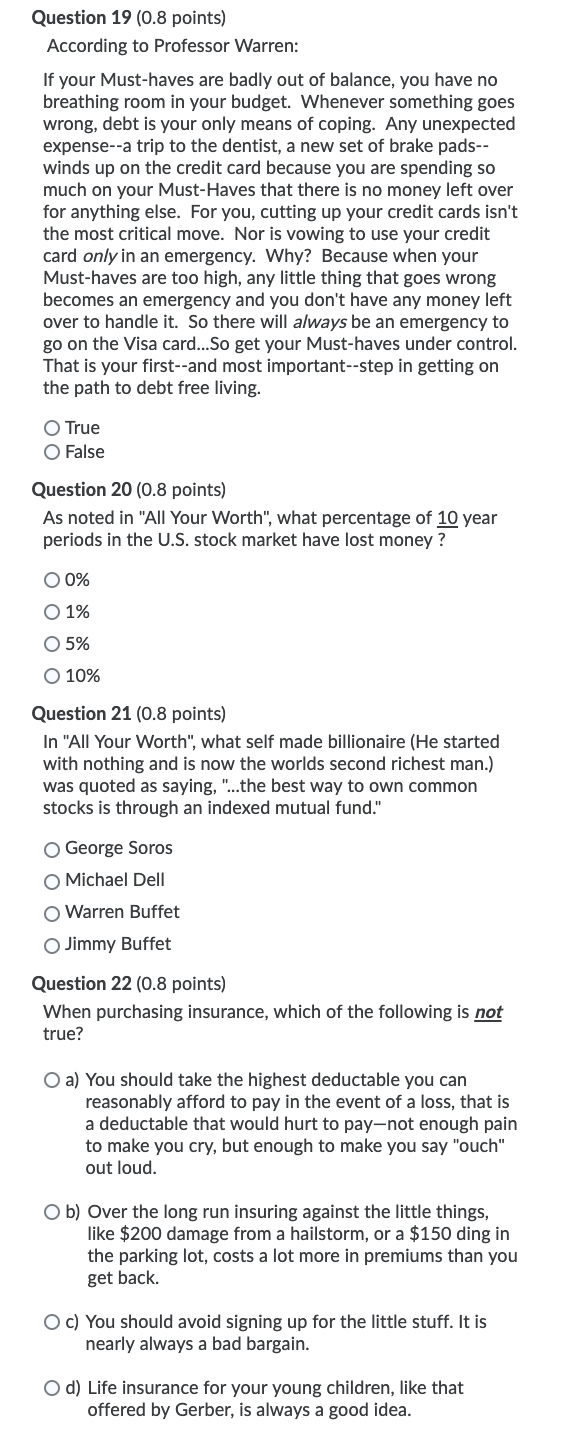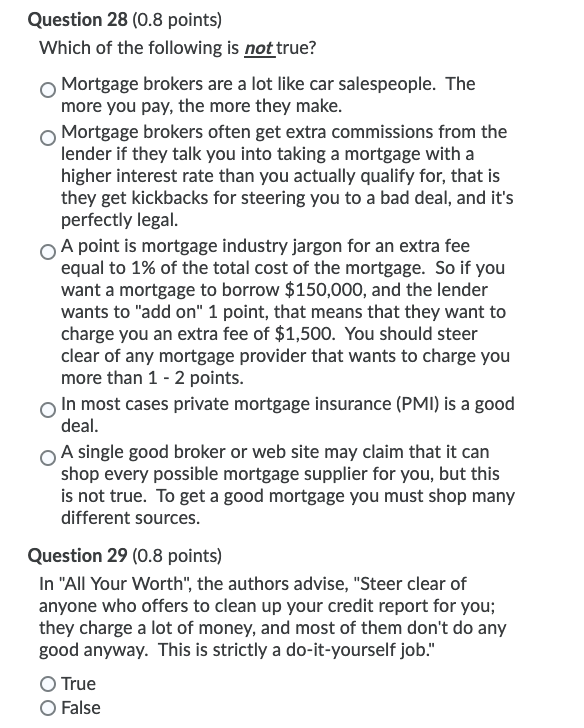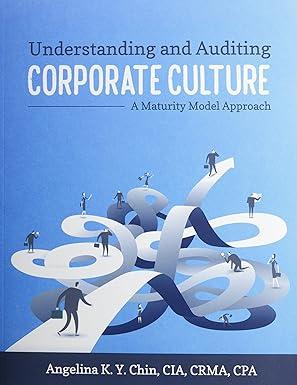


Question 16 (0.8 points) In talking about the "Waiting for the Money Bunny" thinking trap, Professor Warren says, "On the surface it can sound so positive. You tell yourself that your fantasies and daydreams are just an expression of a sunny disposition. You say, 'I believe in myself and my potential. What could be wrong with that?" Professor Warren answers by saying: Nothing-in small doses. A dash of optimism or a moment of idle daydreaming is perfectly fine. Heck, we're not too proud to admit that we've passed a few minutes here and there imagining what we would do if we got a gazillion bucks. The issue is not whether happy fantasies pass through your mind, but whether you let those fantasies guide your actions or more to the point, guide you to inaction. Money fantasies can become another excuse not to act. If someone or something else is going to make your problems disappear, there's no need to do anything. Nothing-you should never think or talk about what could go wrong, not even so you can insure against it, or take measures to make sure it doesn't happen. This would be un-American. Real Americans are always optimistic and this means they never think about or discuss what could go wrong so they can prevent problems, or what is wrong so they can improve things. Nothing-being optimistic doesn't mean thinking about what could go wrong, taking appropriate measures to insure against it, and then not dwelling on it, and focusing on the positive. No, instead, being optimistic means never ever even spending a second thinking about what could go wrong, and always just assuming you will be 100% lucky. Both b and c above. Question 17 (0.8 points) Which of the following is true of cash-value insurance, also known as whole life insurance, or universal life insurance? O It is ordinary life insurance with a savings plan tacked on. It is quite expensive and it requires you to hand over control of your savings plan to an insurance company that usually gets mediocre returns. These policies tend to charge very high agent fees, which usually wipe out any tax savings or other benefits. Most experts agree that you'll get a lot better results if you just buy ordinary term life insurance-and invest the difference on your own. O All of the above. Question 18 (0.8 points) "All Your Worth" Is based on gut reasoning. Is based on more than 20 years of intensive research, drawing on the experiences of literally thousands of people from across the country. Is written by an acclaimed Harvard Professor and her Wharton MBA daughter. Both b and c above. O Question 19 (0.8 points) According to Professor Warren: If your Must-haves are badly out of balance, you have no breathing room in your budget. Whenever something goes wrong, debt is your only means of coping. Any unexpected expense--a trip to the dentist, a new set of brake pads-- winds up on the credit card because you are spending so much on your Must-Haves that there is no money left over for anything else. For you, cutting up your credit cards isn't the most critical move. Nor is vowing to use your credit card only in an emergency. Why? Because when your Must-haves are too high, any little thing that goes wrong becomes an emergency and you don't have any money left over to handle it. So there will always be an emergency to go on the Visa card... So get your Must-haves under control. That is your first--and most important--step in getting on the path to debt free living. O True O False Question 20 (0.8 points) As noted in "All Your Worth", what percentage of 10 year periods in the U.S. stock market have lost money? O 0% O 1% O 5% O 10% Question 21 (0.8 points) In "All Your Worth", what self made billionaire (He started with nothing and is now the worlds second richest man.) was quoted as saying, "...the best way to own common stocks is through an indexed mutual fund." O George Soros O Michael Dell O Warren Buffet Jimmy Buffet Question 22 (0.8 points) When purchasing insurance, which of the following is not true? a) You should take the highest deductable you can reasonably afford to pay in the event of a loss, that is a deductable that would hurt to pay-not enough pain to make you cry, but enough to make you say "ouch" out loud. Ob) Over the long run insuring against the little things, like $200 damage from a hailstorm, or a $150 ding in the parking lot, costs a lot more in premiums than you get back. Oc) You should avoid signing up for the little stuff. It is nearly always a bad bargain. O d) Life insurance for your young children, like that offered by Gerber, is always a good idea. Question 28 (0.8 points) Which of the following is not true? Mortgage brokers are a lot like car salespeople. The more you pay, the more they make. Mortgage brokers often get extra commissions from the lender if they talk you into taking a mortgage with a higher interest rate than you actually qualify for, that is they get kickbacks for steering you to a bad deal, and it's perfectly legal. A point is mortgage industry jargon for an extra fee equal to 1% of the total cost of the mortgage. So if you want a mortgage to borrow $150,000, and the lender wants to "add on" 1 point, that means that they want to charge you an extra fee of $1,500. You should steer clear of any mortgage provider that wants to charge you more than 1 - 2 points. In most cases private mortgage insurance (PMI) is a good deal. A single good broker or web site may claim that it can shop every possible mortgage supplier for you, but this is not true. To get a good mortgage you must shop many different sources. Question 29 (0.8 points) In "All Your Worth", the authors advise, "Steer clear of anyone who offers to clean up your credit report for you; they charge a lot of money, and most of them don't do any good anyway. This is strictly a do-it-yourself job." O True O False









